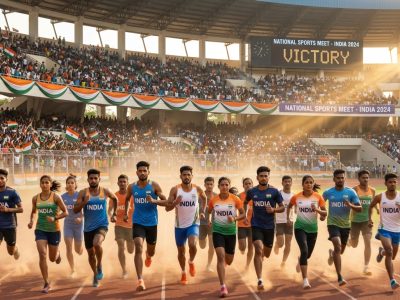Remember that feeling? The electric roar of the crowd in a packed stadium, the heart-stopping silence before a crucial penalty kick, the pure joy of watching a cricket ball sail over the boundary for a six. For so many of us in India, sports isn’t just a game; it’s an emotion, a religion, a fundamental part of who we are. Many of us have dreamt of wearing the Indian jersey, of being the one to score that winning goal or hit that championship-winning six. But what if your path to glory isn’t on the field, but behind it? What if your passion for the game could fuel a successful, thrilling, and vital career that helps shape the very fabric of Indian sports? The truth is, the sporting world is a massive universe, and the athletes are just the brightest stars. There’s a whole galaxy of roles—strategists, healers, storytellers, and business minds—that make the magic happen. This guide is for you, the Indian student with a fire for sports in your belly. Let’s explore how you can build an incredible career in sports, without ever having to be a professional athlete.
Beyond the Boundary: Why a Career in Sports is More Than Just Playing
Let’s be clear: the Indian sports industry is no longer a niche market. It’s a booming economic powerhouse. According to a recent Deloitte-Google report, India’s sports industry is projected to reach a staggering $130 billion by 2030, growing at a rate nearly double the nation’s GDP. Think about the colossal success of the Indian Premier League (IPL), the rise of the Indian Super League (ISL) for football, the Pro Kabaddi League (PKL) reviving an indigenous sport, and the emergence of women’s leagues like the WPL. This isn’t just about games; it’s about business, entertainment, and employment on a massive scale. For every Virat Kohli on the pitch, there is a whole “team behind the team.” These are the professionals who manage the franchise, design the marketing campaigns, ensure the athletes are physically and mentally at their peak, and broadcast the games to millions. Your deep understanding of the game’s nuances and your emotional connection to it isn’t just a hobby; it’s your single greatest asset in this industry.
“You don’t play for the crowd, you play for the country.” – Mahendra Singh Dhoni. This sentiment applies off-field too; your work contributes to the nation’s sporting pride.
The Business of the Game: Careers in Sports Management
If the team is a high-performance engine, then sports management professionals are the ones who build the car, fuel it, and map its route to victory. This is the engine room of any successful sports organization, dealing with everything from finance and marketing to operations and strategy. The days of sports being run by passion alone are over; today, it demands sharp business acumen.
Sports Manager: The Captain of the Ship
Ever wondered who handles player contracts, manages the team’s budget, or scouts for the next big star? That’s the Sports Manager. They are the ultimate multitaskers, ensuring the seamless functioning of a sports team, league, or organization.
- What they do: Handle team operations, manage finances and budgeting, lead marketing and branding efforts, and coordinate between players, coaches, and owners.
- Skills you need: Exceptional leadership, sharp business sense, strong negotiation skills, and an unwavering ability to stay calm under pressure.
- Your Path: A Bachelor’s degree like a BBA or BSc in Sports Management is the perfect starting point. To reach senior positions, an MBA in Sports Management is highly recommended. Institutes like the Institute of Sports Science and Technology (ISST), Pune, offer specialized courses designed to create the next generation of sports leaders in India. With experience, a Sports Manager in India can earn anywhere from ₹5 Lakhs to over ₹20 Lakhs per annum.
Event Management: Crafting Unforgettable Experiences
The magic of a live sporting event doesn’t just happen. It’s meticulously planned and flawlessly executed. Sports Event Managers are the architects of this experience. They are responsible for everything from a local marathon to a massive international cricket series.
- What they do: Plan logistics, manage ticketing and security, coordinate with broadcasters, secure sponsorships, and handle all the million tiny details that make an event successful.
- Skills you need: Superb organizational skills, an eye for detail, quick problem-solving abilities, and a talent for logistics.
- Your Path: While a degree in event management is useful, a specialization in sports event management gives you a significant edge. Practical experience is gold here. Volunteer at college festivals, local tournaments, or seek internships with event management companies to build your portfolio.
The Science of Success: Health and Sports Science Careers
In modern sports, victory is often measured in milliseconds and millimeters. The difference between winning and losing lies in science. Sports science is the backbone of elite performance, focusing on making athletes stronger, faster, and more resilient, both physically and mentally.
Sports Physiotherapist: The Recovery Specialist
An athlete’s greatest fear is injury. The Sports Physiotherapist is their greatest ally. They are experts in the human body, working not just to treat injuries but to prevent them from happening in the first place. With the increasing physical demands of modern sports, their role has become absolutely critical.
- What they do: Design injury prevention programs, provide immediate on-field aid, and create long-term rehabilitation plans to get athletes back in the game.
Skills you need: A profound knowledge of human anatomy and biomechanics, patience, and a high degree of empathy.
Your Path: You need to complete a Bachelor of Physiotherapy (BPT) followed by a Master of Physiotherapy (MPT) with a specialization in Sports Physiotherapy. The demand is huge, from national teams to private academies. Entry-level salaries start around ₹3-4 LPA, but experienced physios working with elite teams can earn upwards of ₹12-15 LPA.
Sports Psychologist: The Mind Coach
“The mind is the most important part of achieving any goal.” – P.V. Sindhu
A game is often won or lost in the mind before it even begins on the field. How does a player handle the pressure of a billion expectations? How do they bounce back from a devastating loss? This is the domain of the Sports Psychologist. They are the mind coaches who build mental fortitude, enhance focus, and help athletes overcome mental blocks.
- What they do: Conduct one-on-one sessions to improve mental toughness, teach visualization and relaxation techniques, and help teams build a positive, winning mindset.
Skills you need: A deep understanding of psychological principles, fantastic listening and communication skills, and the ability to build trust.
Your Path: The journey starts with a Bachelor’s degree in Psychology, followed by a Master’s and often a PG Diploma in Sports Psychology. Gaining practical experience by working with college teams or individual athletes is crucial. It’s a growing field in India with immense potential.
Sports Nutritionist: Fuelling Champions
An athlete’s body is a high-performance engine, and food is its fuel. A Sports Nutritionist is the expert who designs the perfect fueling strategy. They create customized diet plans based on the sport, the athlete’s body type, and their training schedule to optimize energy, enhance performance, and speed up recovery. A degree in Nutrition and Dietetics with a specialized certification in sports nutrition will set you on this rewarding path.
The Voice and Eyes of the Game: Media and Communication Roles
How do millions of fans experience the thrill of the game without being in the stadium? Through the powerful work of media and communication professionals. They are the storytellers who bring the action, drama, and emotion of sports to life for a global audience.
Sports Journalism & Broadcasting: Telling the Story
Whether it’s Harsha Bhogle’s insightful commentary, a gripping match report in a newspaper, or a fiery debate on a sports channel, these are the voices that shape our understanding of the game. Sports journalists and broadcasters are more than just reporters; they are narrators of history in the making.
- What they do: Report on matches, write feature articles, host TV/radio shows, provide live commentary, and create engaging digital content.
- Skills you need: Excellent command of language (English and/or regional languages), strong writing ability, a captivating voice (for broadcasting), and the ability to think on your feet.
- Your Path: A degree in Journalism or Mass Communication is the standard route. However, what truly sets you apart is building a portfolio. Start a sports blog, create a YouTube channel analyzing matches, or write for local publications.
Sports Photography & Videography: Capturing History
Think of that iconic image of MS Dhoni hitting the World Cup-winning six in 2011. That moment was frozen in time by a sports photographer. They have the unique ability to capture the peak of action, emotion, and athleticism in a single frame. It’s a high-pressure job that requires you to anticipate the game’s flow and be in the right place at the right time. While formal degrees aren’t mandatory, courses in photography and building an impressive portfolio are essential to break into this competitive field.
The Brains Behind the Strategy: Tech and Analytics Roles
Welcome to the new frontier of sports. Just like in the movie Moneyball, data has become the secret weapon for teams across the world. India is rapidly catching on, and the demand for tech and analytics professionals in sports is exploding.
Sports Data Analyst: The Numbers Guru
Why does a particular batsman struggle against left-arm spinners? What is the most effective defensive formation against a certain football team? The Sports Data Analyst answers these questions using data. They are the brains behind the strategy, providing coaches and managers with objective insights to make smarter decisions.
- What they do: Collect and analyze vast amounts of player and team data, create performance models, identify patterns, and present insights through data visualization.
- Skills you need: A strong foundation in statistics, proficiency in data analysis tools (like Python or R) and visualization software, and a keen analytical mind.
- Your Path: Degrees in Statistics, Mathematics, or Data Science are ideal. Specialized courses in sports analytics, often offered by institutes like ISST Pune, can give you a direct entry point into this exciting field. Salaries are competitive and are set to grow as more Indian teams adopt a data-driven approach.
Emerging Avenues: The New Playing Fields
The sports industry is constantly evolving, creating new and exciting career paths. These niche areas are perfect for students looking to make their mark in less crowded spaces.
Sports Law, Sponsorships, and more
- Sports Law: As the stakes get higher, so do the legal complexities. Sports lawyers handle everything from player contracts and endorsement deals to intellectual property rights and dispute resolution.
- Sponsorship Manager: These professionals are the bridge between sports properties (teams, leagues) and corporate brands. They secure the vital sponsorship deals that fund the industry.
- Grassroots Development Officer: Working with organizations like the Sports Authority of India (SAI) or private academies, these individuals work at the community level to identify and nurture future talent.
Your First Step: How to Get Started
Feeling inspired? That’s great! But where do you begin? Here’s a simple, actionable plan:
- Immerse Yourself: Go beyond being a casual fan. Read, watch, and learn about the business and science of your favorite sport. Understand the rules, but also understand the industry.
- Volunteer and Intern: This is the single most important step. Offer to help at local sporting events, school tournaments, or marathons. Seek internships with sports companies, media houses, or teams. Practical experience is invaluable and helps you build a network.
- Network Passionately: Connect with people in the industry on platforms like LinkedIn. Don’t be afraid to ask for advice. Your passion will shine through and people will be willing to help.
- Choose the Right Education: Research your options thoroughly. Look for institutions that don’t just offer a degree but provide industry exposure, internships, and a faculty with real-world experience. A specialized institute like ISST, Pune, which is dedicated solely to sports education, can provide the focused learning and connections you need to launch your career.
Conclusion: Your Passion is Your Profession
The roar of the crowd, the thrill of competition, the drama of a last-minute victory—you don’t have to be on the field to be a part of it. A career in sports is a viable, exciting, and deeply fulfilling path for anyone who loves the game. Whether you’re a business whiz, a science geek, a creative storyteller, or a tech guru, there is a place for you in the Indian sports universe. The field is wide open, the opportunities are growing every day, and the industry is waiting for passionate, skilled professionals like you. So, take your passion off the couch and turn it into your profession. Your dream career in sports is waiting for you to make the first move.
Frequently Asked Questions (FAQs)
Do I need to have played sports at a competitive level to get these jobs?
Absolutely not! While having played a sport can give you a good understanding of the game, it’s not a prerequisite for most non-athletic roles. What matters most is your passion, your professional skills, and your willingness to learn the industry.
What is the average salary I can expect in sports management in India?
For an entry-level position in sports management (like an event coordinator or marketing assistant), you can expect a starting salary in the range of ₹3 to ₹5 Lakhs per annum. With a few years of experience and an advanced degree like an MBA, this can quickly grow to ₹8-15 LPA and even higher for senior executive roles in major leagues.
Which undergraduate stream is best for a career in sports? (Science, Commerce, Arts)
The beauty of the sports industry is that it has room for students from all streams. Commerce students are a natural fit for sports management and finance. Science students can excel in sports science, physiotherapy, and analytics. Arts and Humanities students are perfect for journalism, psychology, and media roles. Choose the stream you are good at and then add a specialized sports-related qualification.
How important are internships for a career in the sports industry?
Extremely important. Internships are your gateway into the industry. They provide invaluable hands-on experience, allow you to apply your theoretical knowledge, and most importantly, help you build a professional network that can lead to your first job. Prioritize internships as much as your grades.
Can I build a career in e-sports management in India?
Yes! E-sports is one of the fastest-growing segments of the sports and entertainment industry in India. The principles of management, marketing, event organization, and player management are very similar to traditional sports. Pursuing a course in sports management will equip you with the fundamental skills needed to build a successful career in the exciting world of e-sports.




